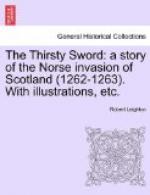“He was duly tried for his ill deeds, your Majesty,” said Kenric, glancing aside at the queen. “He claimed wager of combat with my brother, whom, alas! he overcame and slew in fair fight. Our steward, Sir Oscar Redmain, finding him guilty, nevertheless passed sentence of outlawry upon him — a sentence which I crave you Majesty to ratify.”
“That have we already done,” said the King; “and should this villain again set foot in Scotland, or in any one of the Western Isles, ere his term of outlawry be duly passed, we shall hold no man guilty who puts him to the sword — nay, we shall reward him well. As to the lands of Gigha they are now forfeit, and the lordship over them, my young Earl Kenric, shall henceforth be yours.”
Then the King drawing his sword touched Kenric on his broad back, saying:
“Earl Kenric, in right of your parentage and in virtue of the future service which we shall expect of you, we now pronounce you the rightful lord over the isles of Bute and Gigha, with the title of knight of the most ancient order of the Thistle.”
Sheathing his sword the king then greeted his queen and presented Kenric to her. This honour so embarrassed the youth that when her Majesty asked him questions concerning his mother he could scarcely utter a word, but stuttered woefully.
Daughter of Henry the Third of England, and sister of Prince Edward — who afterwards gave such trouble to the realm of Scotland — Queen Margaret was at this time but one-and-twenty years of age. She was bright eyed and well featured, with a clear fresh complexion, and her every movement was of stately grace. She smiled upon Kenric with her sweet rosy lips, and bade him sit near her and tell her how his mother, accustomed to the life of the English court, contrived to live happily in so wild and dull a place as the little island of Bute. But Kenric in replying noticed only the coronet of pearls that the queen wore in her glossy hair, the surpassing whiteness of her neck and hands, and the rich splendour of her purple velvet gown.
Meanwhile the king had received Sir Piers de Currie.
“This young lord of Bute pleases us well, Ranza,” said King Alexander, addressing the knight by the name of his castle; “and we doubt not that he will prove even as stalwart an adherent as his father, though, indeed, we had been better pleased had he been somewhat older. Take him under your care, Ranza, so that he may acquire some of your own skill at arms.”
“Methinks, sire,” said Sir Piers, “that there is little need of that, for since the death of Alpin, the lad’s brother, there is none whom I could teach less to than young Kenric. A little more weight and strength, it may be, might serve him well. God alone can give him those. But of skill he requires no more than myself.”
“Such praise from you is a recommendation that any man in Scotland might be proud of, Sir Piers,” said the King. “But there is one thing more. Know you if the lad speaks the tongue of these Norse varlets of the isles?”




